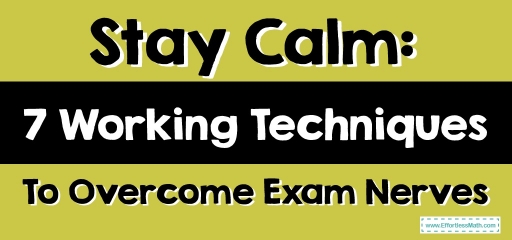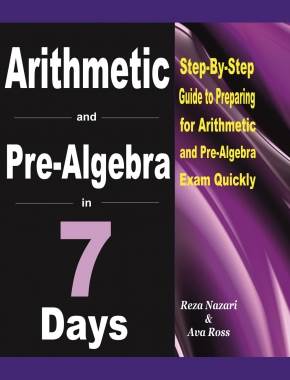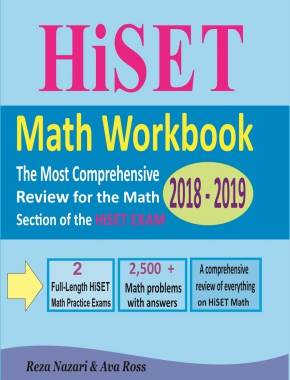Stay Calm: 7 Working Techniques To Overcome Exam Nerves

Midterms and finals are stressful times for every student. Even more so for people who are generally prone to anxiety and worrying over everything. The problem with exam-related stress is that, in addition to being unhealthy, it is also harmful to students’ academic performance. Luckily, it’s possible to minimize it by following these easy tips.

#1 Start studying for the exam at least a week in advance
The guaranteed way to be stressed before the exam is to be unprepared for it. When that’s the case, test anxiety makes perfect sense because the student who experiences it is likely to fail. So no matter how smart you are, don’t think that you can pass (and get a decent grade) without at least a couple of intense study sessions.
Ideally, students should start studying for the exam as early as the course begins. But that’s just wishful thinking. Throughout the semester, most students are busy socializing, wondering “who can help me write my paper,” and otherwise procrastinating. But do start to study for the exam at the very least a week before the date. It’s the least you need to do well and earn a decent grade.
#2 Have a good night’s sleep
One of the worst things a student can do on the eve of an important exam is to pull an all-nighter or study till 3 a.m. to then pass out somewhere on the kitchen table. It’s a sure way to feel awful the next morning, oversleep, and stress even more.
The sad truth is, a student will hardly be able to get ready for the exam if they start studying the night before. Even if they manage to learn a thing or two, everything will evaporate by the time the morning comes. So please start studying in advance and don’t try to make up for all the lost time in one sitting. Go to bed and hope for the better.
#3 Make sure to wake up early enough so that you don’t have to hurry
Everyone who has seen enough movies and TV shows knows this common trope: a bad day always starts with oversleeping and hurrying to get to where the protagonist needs to be on time. Well, the same is the case in real life. If you oversleep and have to be in a rush, your anxiety will go through the roof.
So set the alarm to wake up a little earlier than you usually do (but not too early to avoid feeling sleepy). Go through the same routine you do every morning, including your breakfast, workout, and everything else. At this point, try not to think about the exam too much. Going over the same flashcards over and over again in your head will only make you more stressed.
#4 Eat well
Most students just grab a granola bar and a coffee because they don’t have time or desire to plan their meals. That’s a shame, though. A good diet is one of the main factors that help one’s cognitive processes, including memorizing and problem-solving.
Some of the great and easy breakfast options that will keep you energized and help you think are:
- Quick scrambled eggs
- Avocado toast
- Peanut butter toast and an apple
- Cereal with non-dairy milk
- Banana oatmeal
Also, grab a bag of fruit-and-nut mix to have something to snack on.
#5 Exercise a bit
Even a short YouTube workout is a perfect way to wake up both one’s body and brain. There are tons of studies that show that light physical activity improves students’ cognitive functioning and helps them perform better in school. Yoga, stretching, or a bit of cardio are all great options.
But if you don’t typically work out in the morning (or at all), please don’t try to introduce exercising in your life on the morning of an important exam. It’s always a bad idea to change one’s routine during stressful times, even more so when the stakes are high. So don’t skip your morning workout if you typically have it, but don’t go out of your way to suddenly incorporate it into your schedule either.
#6 Meditate
Meditation is a proven strategy for lowering one’s stress levels and improving one’s mental focus. Even if you’re a skeptic, please give it a chance. There are fantastic meditation apps that can help:
- Headspace. Headspace is the best meditation app for beginners. Its guided meditation exercises are easy to understand and follow, even for a total newbie. Also, the app has a 14-day free trial, which is a pleasant bonus.
- Calm. Calm offers tons of helpful strategies for staying calm, including a wide range of meditation sessions and breathing exercises. Sadly, the app isn’t cheap. But thanks to a 7-day free trial Calm provides, you get to check what you’re paying for first.
- Breathe. Breathe has five-minute-long routines that can help you feel instantly calmer. It’s a great option for everyone who is always on the go and thinks that meditation is too time-consuming to even try.
- Meditation Studio. Meditation Studio offers various types of meditation to choose from depending on your goals, from feeling calmer to being kinder (and everything in between). And at only $50 a year, it is a smart choice on a student budget.
#7 Come up with a pre-exam ritual that helps you calm down
Finally, a helpful trick for the future: come up with a ritual that calms you down and use it before every exam or other event that stresses you out (for example, drinking your morning coffee while sitting on a specific bench on campus). Most mental health professionals recommend that people who struggle with anxiety develop rituals that work specifically for them. But it’s a great technique for everyone.
TLDR
Exams are stressful for everyone, so it’s not possible to avoid stressing over them at least a little bit. But developing a steady morning routine and sticking to it helps. Wake up early enough, have a proper meal, exercise (if you typically do), and meditate. Also, come up with a unique ritual that calms you down and follow it. Good luck!
Related to This Article
More math articles
- Mastering the Metrics of Chance: A Complete Guide to Understanding Random Variables
- FREE CHSPE Math Practice Test
- Top 10 5th Grade FSA Math Practice Questions
- What does SAT Stand for?
- 6th Grade FSA Math FREE Sample Practice Questions
- How to Demystifying the Bell Curve: A Comprehensive Guide to Understanding Normal Distribution
- Overview of the PERT Mathematics Test
- The Ultimate HSPT Math Formula Cheat Sheet
- SHSAT Math – Test Day Tips
- Top 10 Free Websites for HiSET Math Preparation
















What people say about "Stay Calm: 7 Working Techniques To Overcome Exam Nerves - Effortless Math: We Help Students Learn to LOVE Mathematics"?
No one replied yet.